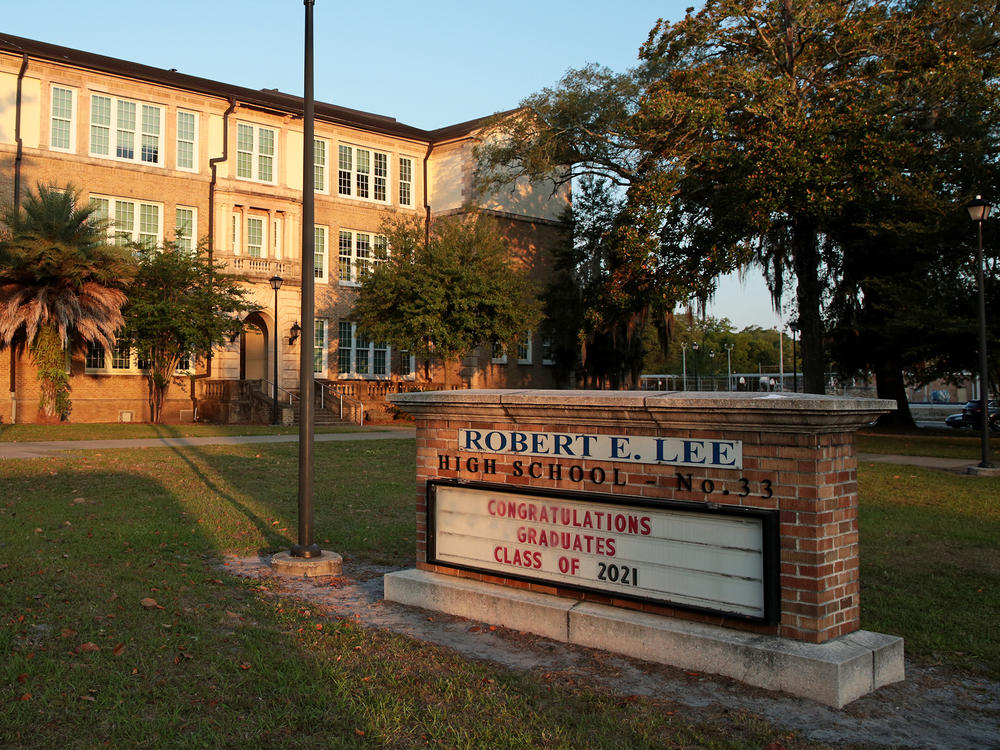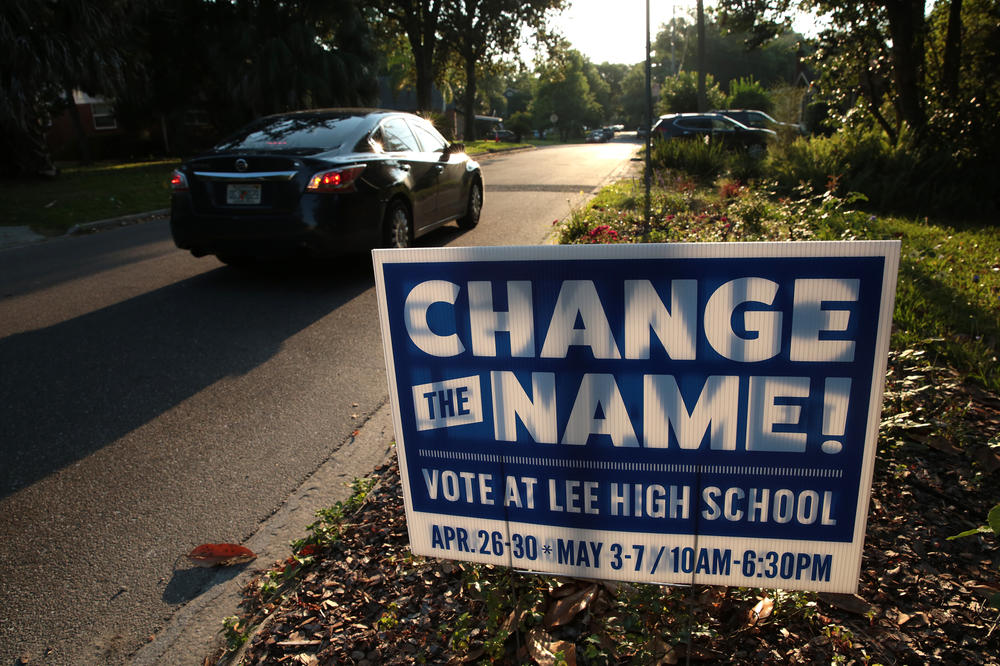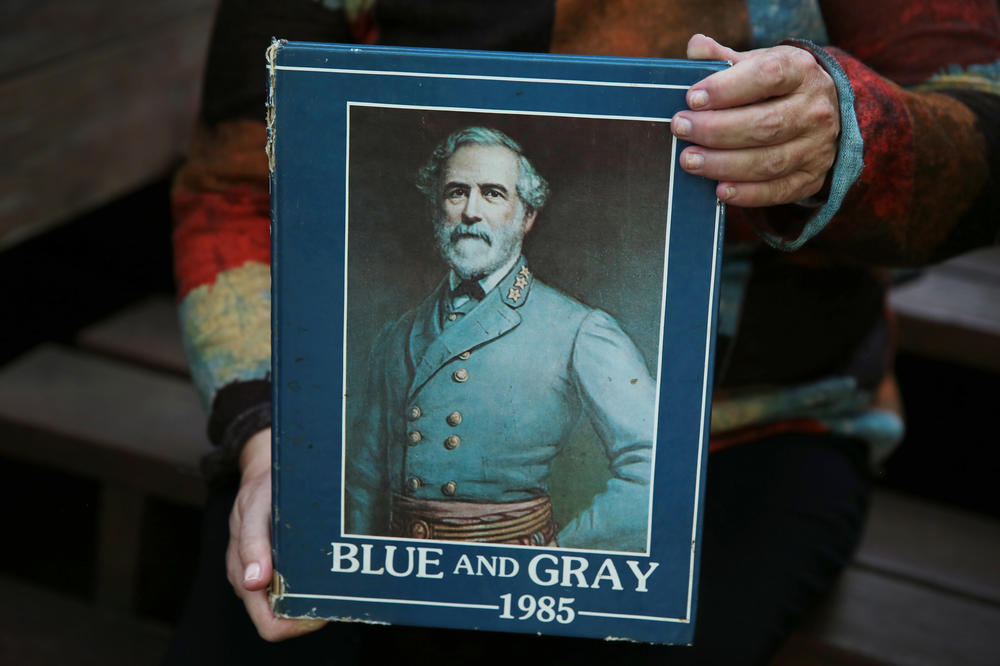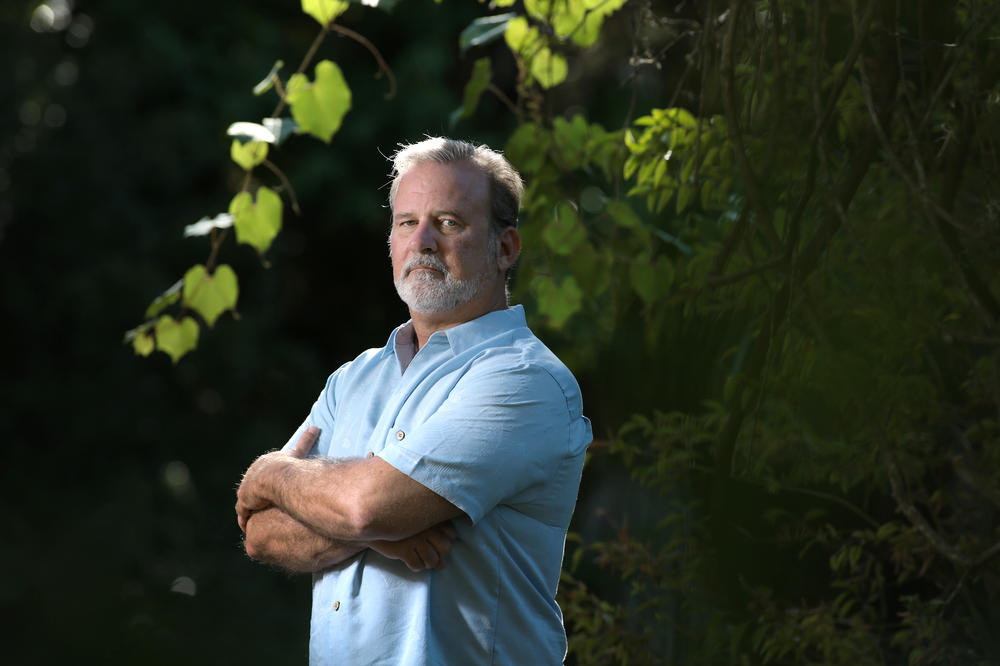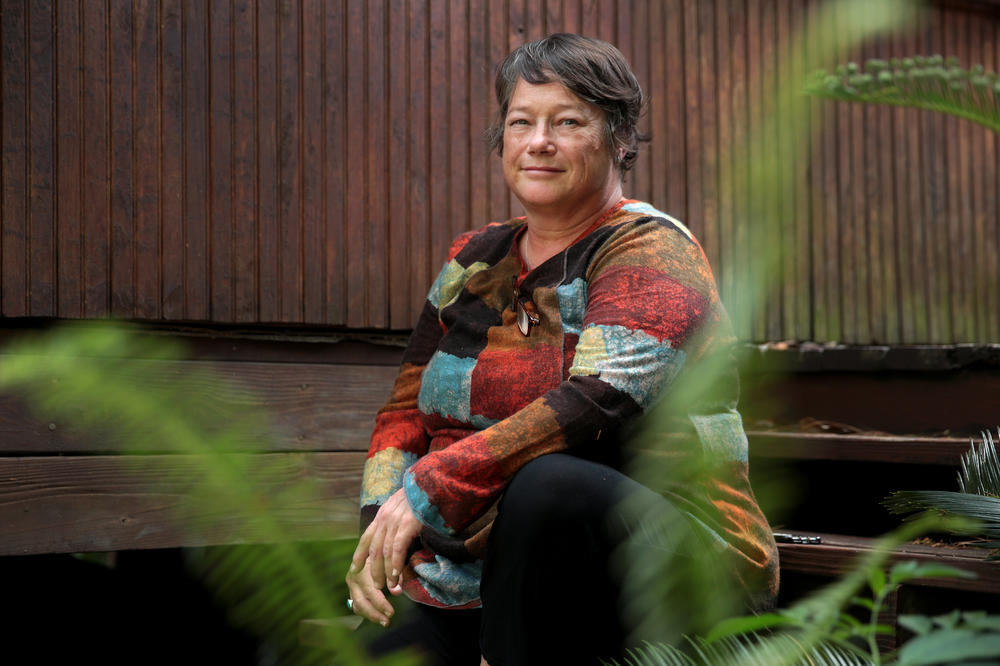Section Branding
Header Content
Confederate Names On Schools Are Flashpoints. Here's One Community's Story
Primary Content
In the wake of the upheaval and protests sparked by the murder of George Floyd, passionate debates ignited in American communities about what to do with the remnants of the Civil War. One such debate has left Jacksonville, Fla., divided.
The county school board there recently took on the question of renaming six schools that carried the names of Confederate leaders. Those six are among the more than 1,700 monuments, places and schools honoring the Confederacy nationwide.
The debate in Jacksonville lasted nearly a year, drew hundreds to community meetings and brought out fierce opinions and exchanges that played out in the Duval County public school system. The schools carry the names Joseph Finegan Elementary School, Stonewall Jackson Elementary School, J.E.B. Stuart Middle School, Kirby-Smith Middle School, Jefferson Davis Middle School and Robert E. Lee High School.
Lee High School's proposed name change drew some of the largest — and loudest — responses in Jacksonville, inflaming tensions among students, activists and alumni.
"This is a very tough decision that this board was brave enough to initiate," County School Superintendent Diana Greene told the board when it convened earlier this week. "Duval County Public Schools are going to get beyond this, and we are going to ensure — from the boardroom to the classroom — that every day counts for our students."
One school's debate
You may not have heard of Jacksonville's Robert E. Lee High School, but you probably know of some of its famous alumni — and their former gym teacher. Members of Lynyrd Skynyrd went to Lee and named the band after that gym teacher, Leonard Skinner. The band went on to write "Sweet Home Alabama," an ode to the South.
The school was built in 1927, at a time when feelings about the Civil War were seeing a resurgence throughout the South.
"[There was] nostalgia for what people in the American South at that time still saw as kind of a lingering feeling of a region that had been marginalized by the rest of the United States," said Alan Bliss, a historian and CEO of the Jacksonville Historical Society. "The context of all of that also coincided with a rise in white racial supremacy directed at the African American minority in the American South. And it marked the period of the rise of the second Ku Klux Klan."
When Lee High School opened to students in 1928, Jacksonville's public schools were segregated and Lee was only open to white students. The school did not fully integrate until 1971. Today, more than 70% of its student body identify as Black.
For Black alumni like Desiree Hightower, the name is not something to be proud of.
"By hanging the name Robert E. Lee, it is making a statement that this school represents, supports and glorifies Confederate politics," the 2017 Lee High School graduate told a town hall meeting on March 25.
Lee High School held five town hall meetings to collect public comment, and during those meetings, white alumni overwhelmingly called for preserving the name. Jacksonville is a majority white city, with 58% of the population identifying as white and 30% of the population identifies as Black.
Kay Rodgers graduated from Lee High School in 1961, when it was still segregated. She told the March 25 town hall that she comes from a military family and has lived in Jacksonville since 1958.
"I am not racist, I never have been racist," she said. "I want you to save the name. I want you to save the history. I want you to save the school. And I want you to save it for our future generations. But if you keep on going the way it is, and if you change the name, I can promise you in 10 years this will not be a good school."
Robert Lawrence, who is white, told NPR he still feels a strong connection to his alma mater. He graduated from Lee in 1980.
"To us, it's not Robert E. Lee, the general. It's Robert E. Lee, the high school," Lawrence said. "I haven't heard anybody offended by the name until recently."
Lawrence spent his senior year portraying the school's mascot, a Confederate general, during football games.
"We were proud to say we went to Robert E. Lee. Everybody was. And this is why it's so difficult for me to even understand [why] we're going through this process," Lawrence said.
A community, split
The district estimates the name change at Lee alone will cost around $287,000. The superintendent said the Jacksonville Jaguars football team will donate $200,000 worth of athletics uniforms for all the renamed schools. Private donations and money from the Jacksonville Public Education Fund will also help pay for the changes.
Lee High School has a strong base of alumni who say hundreds of thousands of dollars have been raised for the school over the last few decades. After a fire damaged the building in 1988, alumni helped pay for the restoration. Several alumni have said they will not feel as compelled to contribute to a school without the Lee name.
"I want to help students, I want to help them learn, I want to help them become good citizens, but I don't see how changing the name is going to do that," Lawrence said. "If you do change the name, the alumni will disappear. Their support will disappear."
But other white alumni say they support the name change.
"This really boils down to having some basic empathy for some of my classmates," Julie Moore, who is white and graduated in 1985, told NPR. "I just feel like we should listen to people of color when they tell us that something is hurtful."
She remembers a teacher at the school who would dress as a Confederate general during lessons about the Civil War.
"He called it the war of Northern aggression," she said. "[He] mumbled the N-word under his mouth. I think about that now and I think about how that really wouldn't fly today, but we didn't have the tools then to stand up to him."
The community largely agreed with changing the name of Lee High School. In a nonbinding vote, 6,513 ballots were cast by Lee High School stakeholders including students, alumni, faculty and community residents, 59% agreed with changing the name.
And the school board concurred. It voted on June 1 to change the names of all six schools.
Similar debates over schools named for Robert E. Lee are happening in districts across the country. In 2020, Fairfax County, Va., renamed its Lee High School for late Congressman John Lewis. The school district in Tyler, Texas, changed its Lee High School to Tyler Legacy. Washington and Lee University, in Lexington, Va., is considering removing Lee's name. After the Civil War, Lee served as that university's president and is entombed on campus, in a chapel that bears his name.
Deyona Burton, Lee High School's class of 2021 senior class president, appeared before the Duval County Schools Board, on Tuesday. She wore her graduation cap.
"My class has been through a lot and a lot of tears, emotion and exhaustion went into the push for the name change while operating within the confines of COVID," she said. "We preserve history by creating a diverse curriculum and teaching history honestly. We amplify school pride by going beyond the name change and continuing to provide resources, thus creating tangible results for students."
The district now begins the process of changing all the signage, websites and other materials at Lee and the other five schools. They'll get new names, including Westside Middle School and Hidden Oaks Elementary.
For Lee students, when they return for classes next school year, they'll step into Riverside High.
Copyright 2021 NPR. To see more, visit https://www.npr.org.
